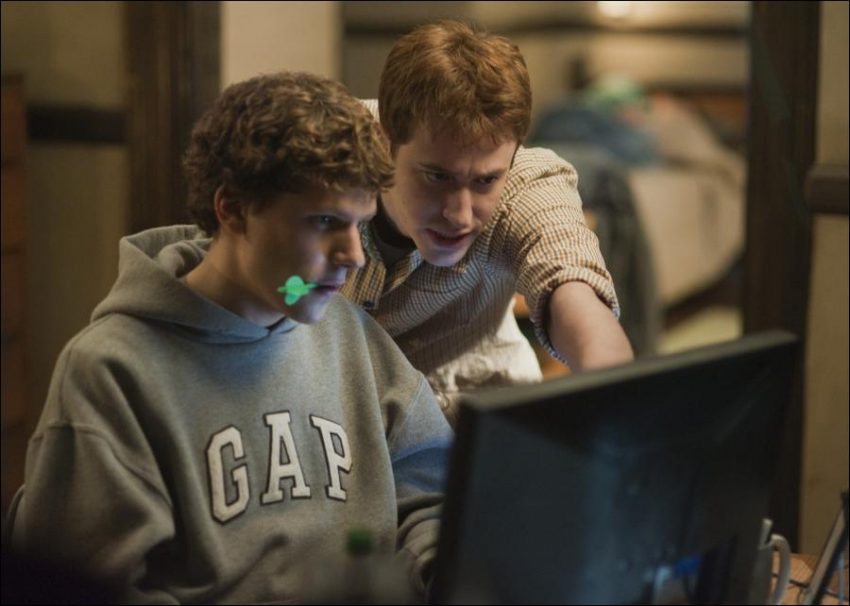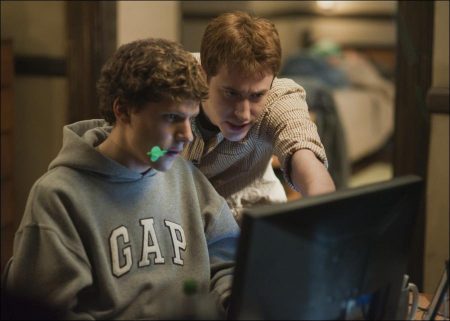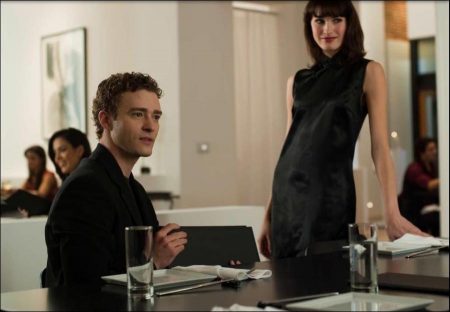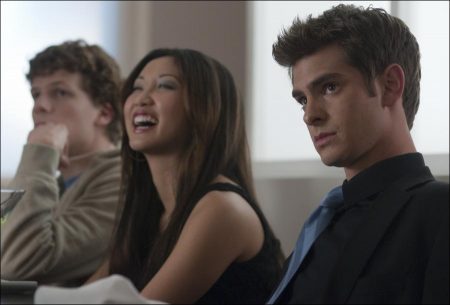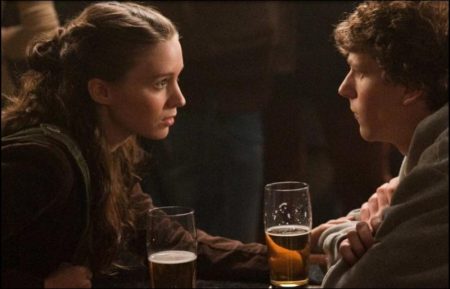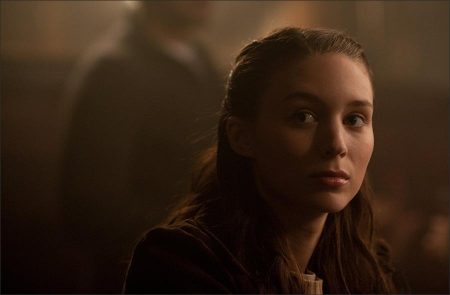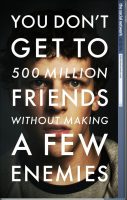Taglines: You don’t get to 500 million friends without making a few enemies.
On a fall night in 2003, Harvard undergrad and computer programming genius Mark Zuckerberg sits down at his computer and heatedly begins working on a new idea. In a fury of blogging and programming, what begins in his dorm room soon becomes a global social network and a revolution in communication. A mere six years and 500 million friends later, Mark Zuckerberg is the youngest billionaire in history… but for this entrpreneur, success leads to both personal and legal complications.
The Social Network explores the moment at which Facebook, the most revolutionary social phenomena of the new century, was invented — through the warring perspectives of the super-smart young men who each claimed to be there at its inception.
The result is a drama rife with both creation and destruction; one that audaciously avoids a singular POV, but instead, by tracking dueling narratives, mirrors the clashing truths and constantly morphing social relationships that define our time.
Drawn from multiple sources, the film captures the visceral thrill of the heady early days of a culture-changing phenomenon in the making — and the way it both pulled a group of young revolutionaries together and then split them apart.
The Social Network is an American drama film directed by David Fincher and written by Aaron Sorkin. Adapted from Ben Mezrich’s 2009 book The Accidental Billionaires: The Founding of Facebook, A Tale of Sex, Money, Genius, and Betrayal, the film portrays the founding of social networking website Facebook and the resulting lawsuits.
It stars Jesse Eisenberg as founder Mark Zuckerberg, along with Andrew Garfield as Eduardo Saverin and Justin Timberlake as Sean Parker, the other principals involved in the website’s creation. Neither Zuckerberg nor any other Facebook staff were involved with the project, although Saverin was a consultant for Mezrich’s book.[3] The film was released in the United States by Columbia Pictures on October 1, 2010.
The Social Network received widespread acclaim, with critics praising its direction, screenplay, acting, editing and score. It appeared on 78 critics’ Top 10 lists for 2010; of those critics, 22 had the film in their number-one spot, the most of any film in its year. Rolling Stone ’s Peter Travers said “The Social Network is the movie of the year. But Fincher and Sorkin triumph by taking it further. Lacing their scathing wit with an aching sadness, they define the dark irony of the past decade.” It was also Roger Ebert’s selection for the best film of the year. Multiple people portrayed in the film, including Zuckerberg and Saverin, have criticized the film’s historical inaccuracies.
At the 83rd Academy Awards, the film received eight nominations, including Best Picture, Best Director for Fincher, and Best Actor for Eisenberg, and won three for Best Adapted Screenplay, Best Original Score, and Best Film Editing. The film also received awards for Best Motion Picture – Drama, Best Director, Best Screenplay, and Best Original Score at the 68th Golden Globe Awards.
The Filmmakers’ Approach
Screenwriter Aaron Sorkin (The West Wing, Charlie Wilson’s War) never said “yes” faster to any project than he did to The Social Network. It began when he received the initial proposal for Ben Mezrich’s book The Accidental Billionaire, a 14-page précis that would instantly spark Sorkin’s own intensive investigation into the history of Facebook.
Sorkin was taken with the accelerated trajectory of the characters – primarily that of Facebook co-founder Mark Zuckerberg, who turned from anarchistic hacker to era-defining webpreneur and CEO practically overnight. Sorkin was equally engaged by the definitively American theme of invention – and the chance to dissect the friendships, rivalries and social maneuverings of the young iconoclasts who seem to come along in every era to create some astonishing new device that fundamentally alters everyday life.
In previous generations it has been the radio, the telephone, the car, the television, the computer. Today, it is the social network. Says Sorkin: “The themes of the movie are as old as storytelling itself: loyalty, friendship, power, money, envy, social status, jealousy. It’s a story that if Aeschylus were alive today, he’d have written; Shakespeare would have written; Paddy Chayefsky would have written. Fortunately for me, none of those people were available, so I got to write it.”
The more he learned about Facebook’s highly disputed origins, the more Sorkin was intrigued by how it seemed to serve as a crisp, close-up snapshot of this very specific time in American life – and equally of such enduring human subjects as genius, power and emptiness. For as technologically brilliant and keyed-in to digital lifestyles as these young upstarts are, they are also, in Sorkin’s portrait, brash, angry and never quite emotionally fulfilled.
“I think there’s a construct in the movie, which is that you can look at all the multi-faceted aspects of Mark Zuckerberg that made him successful and perceive them completely differently depending on who you relate to in the story,” comments Sorkin. ”Mark is driven either by strength or weakness, fear or courage, vision or expedience – and the movie is constantly trafficking in the fine line between those things.”
He goes on: “Mark is an anti-hero who becomes a tragic hero by the end of the movie because he pays a price along the way. He is fundamentally a hacker, and hackers are, by nature, anarchists. It’s about thumbing your nose at the establishment, it’s about tearing down what you believe is in your way. And who is Mark revolting against? It’s the people who are somehow making the world a place that makes him unhappy.
In Mark’s case, the idea of self-worth has alchemized itself into anger, very sharp-edged anger. But anger is fuel to him, it’s rocket fuel and then he has this Eureka idea, and his life seems made. But the very last thing he wants to do is to kill Facebook by commoditizing it, by having it make money and not be anarchistic. That’s the story of the movie – the journey from hacker to CEO. The journey of the film is nothing less than a Horatio Alger story, but our version is this lonely kid in a dorm room who in a very short time becomes a very important figure in the world we live in right now.”
The story of Facebook begins in February of 2004, when the social rubric of everyday life was altered with the launch of what was then known as “thefacebook.com” at Harvard University, a site programmed by Zuckerberg, just 19 years old at the time. Within its first month, more than half of Harvard was registered to use it, and by December of 2005, the site had 5.5 million student users, who posted their most intimate personal details – everything from their favorite songs to who they were dating and more – for any and all to view.
As it spread beyond schools to the rest of the world, Facebook emerged as the globe’s digital public commons – a massive, radiating mesh of connections and relationships representing the social interactions of more than 500 million users (if Facebook were a country, it would now be more than 1.5 times as populous as the United States, and would be the third largest country in the world.)
In just six years, Facebook became a cultural force unto itself – a new mechanism for making friends in an increasingly isolated world and a heavy influence on a generation that has overturned old definitions of privacy. Facebook has helped to forge a brave new world of on-line lives in which everybody knows everyone else’s business, in which people construct their identities for public consumption, and in which many use Facebook as an archive for the entire breadth of their existence.
Like other major technological revolutions before it, Facebook has already been both celebrated and excoriated for its impact – the full consequences of which even the savviest social analysts can’t quantify so early in the game. Growing at a break-neck pace and with its potential still fundamentally un-charted, the company, though privately held, was recently valued north of $25 billion, and some estimates from Wall Street put its value considerably higher.
But even as it grew, major lawsuits embroiled the company, and its founders, in conflict — and the early provenance of Facebook became a fascinating series of battles for ownership and recognition. A group of Zuckerberg’s former Harvard classmates, including the Winklevoss brothers, alleged that Zuckerberg had stolen their idea for a social network; while Zuckerberg’s one-time business partner and Facebook co-founder, Eduardo Saverin, alleged he had been frozen out of the company by Zuckerberg after financing its early growth.
To learn more about all these facts and about our popular understanding of (and response to) Facebook, Sorkin set up his own web page asking for people’s input and received some 10,000 visitors before he shut the page down. He pored through the reporting notes of Ben Mezrich (though not his book, which was written simultaneous to the screenplay, and which was not completed until Sorkin was nearly done with his script) and conducted his own research, making his way through numerous legal filings and interviews with many of the people depicted in the movie (and many who were present at the events described, although in some cases not depicted in the movie) that made clear the starkly contrasting views of Facebook’s early days.
All of these sources, integrated in a panoramic way, formed the structural backbone of the screenplay. Sorkin was refused access to Zuckerberg, which did not surprise him, but used many public sources, including reportage and legal filings, to incorporate his perspective. “Facebook is very protective of Mark, and they have good reason to be,” Sorkin says, adding, “I’m sure Facebook would have preferred that we told the story entirely from Mark’s point-of-view, but that wasn’t the movie we wanted to make.”
It became clear to Sorkin as he began to write, that as carefully sourced as the screenplay was, he would be juggling a series of equally “unreliable narrators,” each with a differing version of events, none of which, years later, anyone involved directly can come close to agreeing upon – and each of which needed to be integrated into the story in order to forge the broader picture.
“Because there were conflicting narratives, rather than decide on one ‘true’ one, I thought the more exciting thing to do would be to literally dramatize all of them – and to dramatize the fact that there are conflicting narratives,” explains Sorkin. ”I was so much more interested in shades of gray than I was in black-and-white. Also, the idea of a series of possible scenarios, possible realities even, seemed immediately to have so much more to do with Facebook itself — what Facebook actually is — than just a straight-ahead plot. One of the most compelling things to me about Facebook is the limitless possibilities it offers for reinvention and fabrication and putting forward a very subjective idea of the ‘truth’ about yourself – so it felt exciting and provocative to me that I could mirror that in building a story of how the thing itself was incepted.”
It was Sorkin’s way in to revealing all the friction and burgeoning enmity that led to the creation of the world’s most powerful social network. He made it work by putting his emphasis on uncovering the individual intentions and warring objectives of each of the characters.
“This is a movie that, whenever it can, turns the prism to show you another side of the story,” he says. ”I think the sign of a good movie is that you can argue for more than one side, but the basis of my ability to coherently make those arguments was an incredible amount of research. Without the research, without being steeped in facts, it’s all fiction – and this isn’t fiction.”
Sorkin found himself particularly intrigued by Mark Zuckerberg’s internal contradictions as a young man who demonstrates a certain amount of social awkwardness, and yet comes up with a brilliant way to transform the basics of the human social urge into pioneering computer code. Even at a time when he was an outsider at Harvard, Zuckerberg’s initial concept was to mathematically model what he has referred to as the “social graph,” the radiating, sustaining links every person has to all the other people they know.
“The fact that someone with enormous and almost inchoate social awkwardness creates a vision for this network of social interaction, a public commons, essentially, in which people never have to be in the same room to communicate – well, that was pretty irresistible,” says Sorkin. “Also, there’s a hugely dramatic idea, to me, in what makes Mark not only a creator but also a destroyer – and it’s a fantastic subject to write about, since most of our greatest creators are in some very basic way also destroyers. Our visionary builders are often equally adept at tearing down what came before them and what is in front of them as they start to understand what it takes to realize their vision. You can look at endless examples of this – it’s a great trope in what people mean when they describe ‘the American character’. Mark is like a 21st century iteration of a Fitzgerald character or a Dreiser character. Where was I ever going to find that again?”
For Sorkin, the opening scene to the film was key to setting the tone. ”I knew I wanted it to open up on a girl and a guy in a bar,” he says, “no pyrotechnics, just two people, Mark and his girlfriend, and she is going to break up with him by the end of the scene. Then he would go back to his dorm room, start drinking, blogging and create the website Facemash. Facemash would go viral and we would cut right to the deposition where the first words out of Mark’s mouth are ‘That’s not what happened.’ That moment, that one cut, essentially hands you the key to the structure of the movie.”
That structure purposefully keeps bumping up against the nature of the truth as a subjective construct, something that has only been magnified in the internet era, as instant, indelible communication can turn rumors and innuendo into globally accepted fact. As one of the characters in the film says to Zuckerberg, “The internet isn’t written in pencil, Mark. It’s written in ink.”
“There’s a certain ease with which an assertion now becomes known as truth,” says Sorkin. ”Early in the film, Mark, perhaps cavalierly, uses this when he creates Facemash, the precursor to Facebook that rated female students’ photos — but by the end, he has also fallen victim to it himself.” Ultimately, Sorkin’s screenplay defies the notion that there can be a single truth and he fully intends for this to provoke debate.
Sums up the screenwriter: “I’ll be delighted if people have arguments in the theatre parking lot over it. With The Social Network, we took a set of facts, and we made a truth. In fact, more specifically, we made three truths. If you think of the facts that aren’t in dispute as dots that you have to connect, we connected those dots and we made a picture. But in between those dots are a) character, and b) the fact that you get to decide what the truth is. We don’t tell you ‘this is the only truth there is,’ we posit a handful of truths in pursuit of a larger true thing: the conditions that made all this possible.”
The Social Network (2010)
Directed by: David Fincher
Starring: Jesse Eisenberg, Rooney Mara, Bryan Barter, Justin Timberlake, Andrew Garfield, Dustin Fitzsimons, Armie Hammer, Alecia Svensen, Scotty Crowe, Marcella Lentz-Pope, James Dastoli
Screenplay by: Aaron Sorkin, Ben Mezrich
Production Design by: Donald Graham Burt
Cinematography by: Jeff Cronenweth
Film Editing by: Kirk Baxter, Angus Wall
Costume Design by: Jacqueline West
Set Decoration by: Victor J. Zolfo
Art Direction by: Curt Beech, Keith P. Cunningham
Music by: Trent Reznor, Atticus Ross
MPAA Rating: PG-13 for sexual content, drug and alcohol use and language.
Studio: Columbia Pictures
Release Date: October 1, 2010
